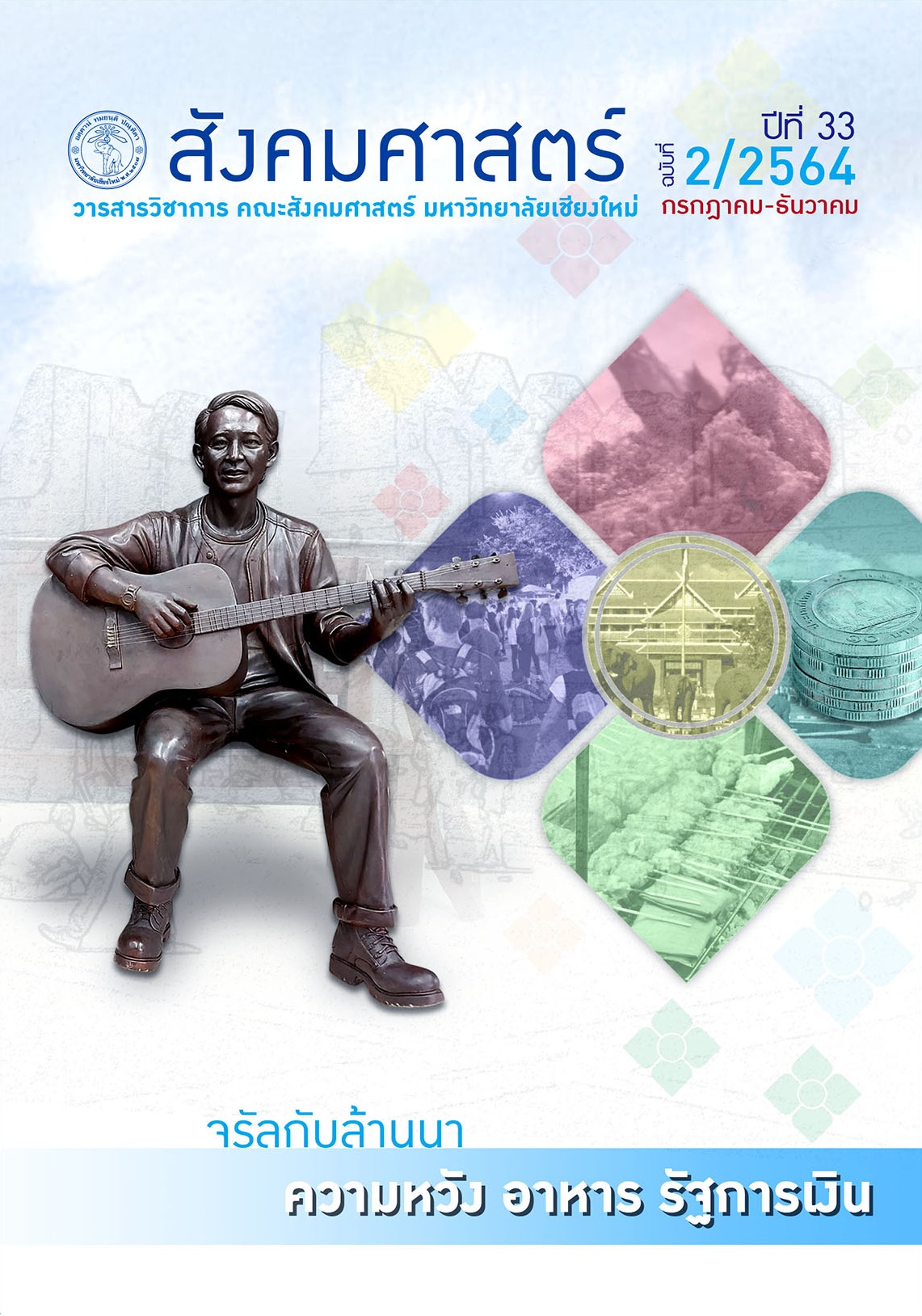ห่วงโซ่อุปทานอาหารในเศรษฐกิจเมือง : กรณีศึกษาผู้ค้าอาหารข้างทางในกรุงเทพมหานคร
Main Article Content
บทคัดย่อ
ผู้ค้าอาหารข้างทางเป็นผู้เล่นสำคัญในกิจกรรมเศรษฐกิจในภาคไม่เป็นทางการ บทความนี้วิเคราะห์ให้เห็นปฏิบัติการในห่วงโซ่อุปทานอาหาร เกิดการพึ่งพิงระหว่างกันทั้งผู้ผลิตรายย่อย บรรษัทธุรกิจ ผู้ค้าส่ง ผู้ค้าในตลาด ผู้ค้าอาหารข้างทาง และผู้บริโภค การเสนอของบทความนี้เป็นข้อมูลจากการสำรวจแบบสอบถามกับผู้ค้าอาหารข้างทางในเขตพระนคร เขตบางรัก และเขตบางกะปิ ทั้งหมด 150 คน และใช้กรณีศึกษาของผู้ค้าอาหารข้างทางและผู้ค้าในตลาดร่วมอธิบาย เพื่อยืนยันความสำคัญของการค้าอาหารข้างทาง เนื่องจากซื้อวัตถุดิบจากผู้ค้าในตลาดและผู้ผลิตรายย่อย ทำนองเดียวกันแหล่งอาหารข้างทางเป็นสิ่งสำคัญสำหรับผู้บริโภค และยังสนับสนุนทางอ้อมให้เศรษฐกิจภาคทางการในเขตเมือง
Article Details
ข้อเขียนทั้งหมดทีปรากฏในวารสารสังคมศาสตร์ เป็นความคิดเห็นของผู้เขียนโดยเฉพาะ มิใช่ทัศนคติของคณะสังคมศาสตร์ มหาวิทยาลัยเชียงใหม่ หรือกองบรรณาธิการวารสารสังคมศาสตร์
เอกสารอ้างอิง
Allen, Summer, Mar Maestre, and Aulo Gelli. 2019. “Food Value Chains for Nutrition. Agriculture for Improved Nutrition: Seizing the Momentum”. Accessed 30, July 2021. https://bit.ly/39PhklB
AlSayyad, Nezar. 2004. “Urban Informality as a ‘New’ Way of Life. Urban Informality: Transnational Perspectives from the Middle East, Latin America, and South Asia”. Accessed 30, July 2021. https://bit.ly/39S9wiY
Angsuthonsombat, Kannika, and Chidchanok Samantrakula. 2019. “Bangkok’s Street Vending Ban: A Summary of the Research on the Social and Economic Impacts”. WIEGO Resource Document No. 12. Accessed 30, July 2021. https://bit.ly/3ohrfc3
Bangasser, Paul E. 2000. “The ILO and the informal sector: an institutional history”. Accessed 30, July 2021. https://bit.ly/3oyJeLx
Banks, Nicola, Melanie Lombard, and Diana Mitlin. 2020. “Urban Informality as a Site of Critical Analysis”. The Journal of Development Studies 56(2): 223-238.
Bonner, Chris, and Françoise Carré. 2013. “Global Networking: Informal Workers Build Solidarity, Power, and Representation through Networks and Alliances”. WIEGO working paper. Accessed 30, July 2021. https://bit.ly/3APPZf3
Carré, Françoise, Pat Horn, and Chris Bonner. 2018. “Collective Bargaining by Informal Workers in the Global South: Where and How It Takes Place”. WIEGO working paper. Accessed 30, July 2021. https://bit.ly/3AWd142
Carrillo-Rodriguez, Jorge, and Sarah Orleans Reed. 2018. “If Street Food Disappears – Projecting the Cost for Consumers in Bangkok”. WIEGO resource document No. 9. Accessed 30, July 2021. https://bit.ly/3kTuKnd
Chen, Martha Alter. 2012. “The informal economy: Definitions, theories and policies. WIEGO working paper”. Accessed 30, July 2021. https://bit.ly/3unKm5g
Crush, Jonathan, and Bruce Frayne. 2011. “Supermarket expansion and the informal food economy in Southern African cities: implications for urban food security”. Journal of Southern African Studies 37(4): 781-807.
d’Alençon, Paola Alfaro, et al. 2018. “Interrogating informality: Conceptualisations, practices and policies in the light of the New Urban Agenda”. Habitat International 75: 59-66.
Ghani, Syed Ejaz, and Ravi Kanbur. 2012. “Urbanization and (In)Formalization”. Accessed 30, July 2021. https://bit.ly/2ZIGNvo
Guha-Khasnobis, Basudeb, Ravi Kanbur, and Elinor Ostrom. 2006. “Beyond formality and informality. Linking the formal and informal economy: Concepts and policies”. Accessed 30, July 2021. https://bit.ly/3uqC7FD
Haid, Christian G., and Hanna Hilbrandt. 2019. “Urban informality and the state: geographical translations and conceptual alliances”. International Journal of Urban and Regional Research 43(3): 551-562.
Harriss-White, Barbara. 2020. “India’s Informal Economy: Past, Present and Future”. In The Informal Economy Revisited: Examining the Past, Envisioning the Future, edited by Martha Alter Chen, 38-44. London: Routledge.
Hart, Keith. 1985. The Informal Economy. Cambridge Anthropology, 10(2), 54-58.
International Labour Office. 1972. “Activities of the ILO, 1971: Report of the director-general (part 2)”. Accessed 30, July 2021. https://bit.ly/39Tf5xP
International Labour Office. 1984. “Urbanisation, informal sector and employment: A progress report on research, advisory services and technical cooperation”. Accessed 30, July 2021. https://bit.ly/3F6gr6A
International Labour Office. 2002. “Decent work and the informal economy (Sixth item on the agenda)”. Accessed 30, July 2021. https://bit.ly/3mfl99F
Kanbur, Ravi. 2009. “Conceptualising informality: regulation and enforcement”. Accessed 30, July 2021. https://bit.ly/3D1R6c2
Kanbur, Ravi. 2011. “Avoiding informality traps”. Accessed 30, July 2021. https://bit.ly/3F637iM
Kanbur, Ravi. 2014. “Mindsets, Trends, and the Informal Economy”. Accessed 30, July 2021. https://bit.ly/3kUAzk6
Lutzoni, Laura. 2016. “In-formalised urban space design. Rethinking the relationship between formal and informal”. City, Territory and Architecture 3(20): https://doi.org/10.1186/s40410-016-0046-9
Mabogunje, Akin L. 1990. “Urban planning and the post-colonial state in Africa: A Research Overview 1”. African Studies Review 33(2): 121-203.
Maloney, William F., and Jaime Saavedra-Chanduvi. 2007. “The informal sector: What is it, Why do we care, and How do wo measure it?”. In Informality: exit and exclusion, edited by Perry, Guillermo E, et al., 21-41. Accessed 30, July 2021. https://bit.ly/3uqCCQ1
Marx, Colin, and Emily Kelling. 2019. “Knowing urban informalities”. Urban Studies, 56(3), 494-509.
McFarlane, Colin, and Michael Waibel. 2012. “Introduction: The informal-formal divide in context”. In Urban Informalities: Reflections on the Formal and Informal, edited by McFarlane, Colin, and Michael Waibel, 15-26. London: Routledge.
Nickanor, Ndeyapo, and Lawrence Kazembe. 2017. “The Supermarket revolution and food security in Namibia (No. 26)”. Southern African Migration Programme. Accessed 30, July 2021. https://bit.ly/2Y3TmB7
Nielsen, William Iver, et al. 2020. “Re-thinking the Approach to Informal Businesses”. Accessed 30, July 2021. https://bit.ly/2Y4twwP
Orleans Reed, Sarah, et al. 2017. “Informal Workers in Bangkok, Thailand: Scan of Four Occupational Sectors”. Accessed 30, July 2021. https://bit.ly/3ig9m9F
Rogan, Michael, et al. 2017. “Informal employment in the global south: Globalization, production relations, and “precarity””. In Precarious Work, edited by Kalleberg, Arne L., and Steven P. Vallas, 307-333. Emerald Publishing Limited.
Schindler, Seth. 2017. “Beyond a state-centric approach to urban informality: Interactions between Delhi’s middle class and the informal service sector”. Current Sociology 65(2): 248-259.
Senghaas-Knobloch, Eva. 1977. Informal sector and peripheral capitalism: a critique of a prevailing concept of development. Manpower and Unemployment Research 10(2): 3-24.
Sethuraman, Salem V. 1976. The urban informal sector: Concept, measurement and policy. International Labour Review 114(1): 69-81.
Singer, Hans Wolfgang. 1970. “Dualism revisited: a new approach to the problems of the dual society in developing countries”. The Journal of Development Studies 7(1): 60-75.
Singer, Hans Wolfgang. 1972. “The technology gap and the developing countries”. International Journal of Environmental Studies, 3(1-4), 119-123.
Sinha, Anushree, and Ravi Kanbur. 2012. “Informality: Concepts, facts and models”. Accessed 30, July 2021. https://bit.ly/3mdGIr0
Tokman, Victor E. 1977. “An exploration into the nature of informal-formal sector interrelationships”. Accessed 30, July 2021. https://bit.ly/3unMBpp
Varley, Ann. 2013. “Postcolonialising informality?”. Environment and Planning D: Society and Space, 31(1), 4-22.
Young, Graeme, and Jonathan Crush. 2019. “Governing the informal food sector in cities of the Global South (discussion paper no. 30)”. Accessed 30, July 2021. https://bit.ly/3kRKp6g


